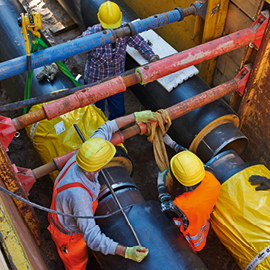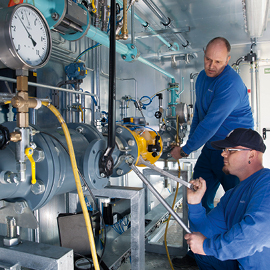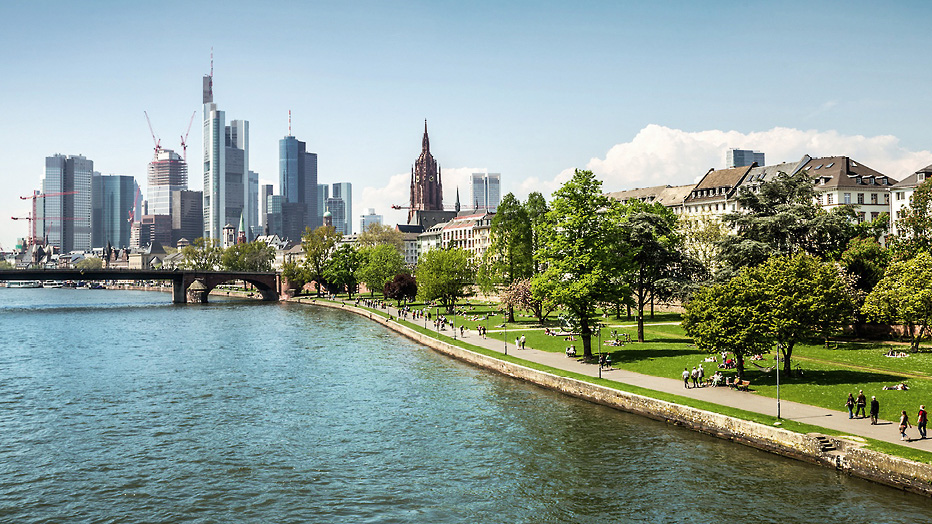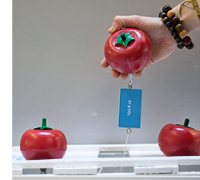Project Profile
Project Title: „Masterplan 100 % Climate Protection Frankfurt am Main“
Subject Cluster: Climate Protection and Open Spaces
Project Objectives: Converting Frankfurt’s energy supply to 100% renewable energy by 2050; with wide public participation.
Project Duration: 01.01.2013 – 31.12.2016
Sponsors: Federal Ministry for the Environment, Nature Conservation, Building and Nuclear Safety as part of the National Climate Protection Initiative (NKI)
Project Leader: Frankfurt Energy Department
Frankfurt has committed itself to converting its entire energy supply to renewable energies by 2050. This means halving energy consumption and reducing CO₂ emissions by 95 percent. The „Masterplan 100 % Climate Protection“ study is the basis for this, containing scenarios, strategies and measures to achieve this aim.
Since the founding of the Energy Agency and the co-founding of the Climate Alliance in 1990, Frankfurt has put a great deal of effort into climate protection. In 2012, the City Council decided to convert the city’s entire energy supply to renewable energies by 2050 and to develop the „Masterplan 100 % Climate Protection“ for its implementation. The project began in 2013, updating Frankfurt’s 2008 Energy and Climate Protection Concept.
The process is sponsored by the Federal Ministry for the Environment, Nature Conservation and Nuclear Safety. Frankfurt is one of 19 communities and rural districts which have been sponsored since 2012. By increasing energy efficiency, supporting sustainable lifestyles among residents and sustainable management in local companies, these „Masterplan communities“ undertake to lower greenhouse gas emissions by 95 percent by 2050. The most significant feature is the use of renewable energies especially from local sources and promoting regional material cycles.
Checking feasibility, setting the path
Initial scenarios show that the transition to an exclusively regenerative energy supply in Frankfurt is possible, provided that the energy consumption of today is halved. Most of the energies needed can then be produced from renewable sources in Frankfurt and the Rhein-Main Region.
If some of the energy comes from Hessen, more wind energy and biomass can be used. Importing less electricity from the rest of Germany would also mean cheaper storage facilities, which would lower electricity costs considerably.

of CO₂ was saved by 63 companies participating in the Ökoprofit project from 2007 to 2015. In this period they lowered their power consumption by 11.4 kWh, saving 395 million euros.
Involving the urban society
The ambitious goals of the “Masterplan 100 % Climate Protection“ call for both intensive interdepartmental cooperation within the city administration and mutual involvement in concepts such as the mobility strategy and the urban development concept ISteK, which are currently being developed.
However, these aims cannot be reached without input from the urban society. A large number of individual initiatives will have to be implemented and the participation of local inhabitants, companies, energy providers, the housing industry, universities and science and other stakeholders is indispensable.
These groups were already involved at an early stage in brainstorming and preparing the study. There were numerous workshops, lectures and information stands and a series of resident participation events at which over 800 inhabitants took part, drawing up proposals on climate protection. These included technical measures, appeals for new ways of thinking and ideas to promote climate-friendly behaviour.
Proposing action and giving orientation
The Masterplan focuses on three areas: heat, electricity and local traffic. Not only consumption must be cut drastically, demand and supply must also be aligned and optimised. Complexity will increase since the sectors interconnect more and more, e.g. through cogeneration, heat pumps and electromobility.In collaboration with the Fraunhofer Institute for Building Physics (IBP), the city analysed current consumption in the three areas and also inner-city energy generation. On the basis of this status quo a wide range of measures was developed which can lower the demand for energy.The catalogue of measures names potential stakeholders, possible savings and anticipated investment costs and includes both technical measures and other schemes to promote acceptance among the inhabitants and encourage them to get involved and implement action themselves.Potential areas for renewable energies and enhanced networking and control were also identified. “Roadmaps“ with development paths and landmarks give orientation, even when technological developments and changes in the political framework until 2050 cannot be foreseen.

Renewable energy sources
Converting to an exclusively regenerative energy supply; energy production largely from renewable sources in Frankfurt and the Rhein-Main Region; promoting sustainable regional material cycles.

Energy efficiency
Halving the energy consumption of today; aligning supply and demand for heat, electricity and local traffic; promoting climate-friendly behaviour; catalogue of measures and roadmaps.

Urban society
Participation of residents, companies, energy providers, housing industry, universities and science; involvement in brainstorming and concept development; motivation to implement own measures.
Saving with a bonus – Frankfurt is saving electricity
Individual advice, tips on saving electricity and on the purchase of household appliances and consumer electronics and, of course, the energy saving ¬bonus – the „Frankfurt is saving electricity“ initiative targets consumers and SMEs in Frankfurt.In 2008, Frankfurt was the first city in Germany to reward energy savers financially. The city pays a bonus of 20 Euros, and another 10 cents for every additional kilowatt hour saved, to anyone lowering their electricity consumption by at least 10 percent in one year. So far, the participants have saved an average of 65 euros and also protected the climate.

Linking up for more efficiency – Mainova AG is expanding its district heating network
Expanding Frankfurt’s district heating network will have a considerable impact on the savings anticipated in the Masterplan. The municipal energy provider Mainova AG is investing about 65 million euros in laying district heating pipelines to connect the combined heat and power plants (CHP) Messe, West and Niederrad with the waste-to-energy plant (MHKW) in Nordweststadt by 2017. The CHP West will regulate centrally the amount of district heating the power stations can feed. After its extensive ongoing modernisation, the CHP will not only produce steam as a heat transfer medium but also hot water for the other power stations. In all, another 63 million euros (excluding the waste-fuelled power plant) is being spent on refitting and modernising the power stations.
District heating in the Frankfurt network is generated primarily using the combined heat and power process (CHP) which produces both electricity and heat, whereby the fuel used is exploited much more efficiently than in separate electricity and heat generation. Linking the generation plants can use existing redundancies to further develop the district heating network. The heat produced in the CHP plant (50 percent from renewable fuels such as organic waste), can be used more effectively. Smaller power stations are being shut down and replaced by district heating. The excellent interaction of all the power stations lowers fuel consumption and reduces CO₂ emissions by about 100,000 tonnes a year.
CHP plants are very efficient and easy to control which makes them an ideal supplement when wind and solar plants produce too little electricity. The district heating system, in combination with power-to-heat plants and thermal storage, can collect the surplus electricity from these plants and serve as a reservoir.
Climate-friendly nutrition – climate gourmet
On average, 14 percent of a German’s CO₂ footprint ensues from nutrition. Climate gourmet shows how to reduce this - simply and deliciously - and live more sustainably. At eleven interactive stations an award-winning touring exhibition addresses topics such as the greenhouse effect, the link between CO₂ emissions and choice of food or production and transport costs. The second climate gourmet week offered a diverse programme with talks, cookery courses and films while project weeks were held in schools. The Climate Gourmet Guide has an online map listing providers and local initiatives engaged in climate-friendly nutrition. The project was initiated by the Energy Department in Frankfurt and the “Nachhaltigkeit lernen in Frankfurt“ network.
Companies conserve resources – ÖKOPROFIT Frankfurt am Main
Reducing operating costs while protecting natural resources: this is the aim of ÖKOPROFIT Frankfurt am Main. Frankfurt Energy Department’s cooperation project with the local economy is a low-threshold offer for developing an operational energy and environmental management system. It is also a network programme to promote sustainability in the economy.In joint workshops, the companies develop and implement proposals for energy, water and waste management, sustainable procurement and employee motivation. There is also individual consultation and certification.The project is one cornerstone of Frankfurt’s climate protection policy and targets companies and operational installations which would like to improve their environmental balance. So far 65 enterprises in Frankfurt have successfully completed the programme, which has implemented six project cycles since 2007.
Guidepost in energy issues – Energiepunkt FrankfurtRheinMain e. V.
For developers, modernisers, tenants and SMEs, the Energiepunkt FrankfurtRheinMain e.V. is a guidepost in energy matters. People seeking advice receive, for example, information on saving energy, more efficient energy supply and funding opportunities for renovation and new building. Planners, consultants and craftsmen also have the opportunity to exchange experiences, to cooperate and learn about further education. The aim is to improve the quality of energy counselling over a longer term. The Energiepunkt FrankfurtRheinMain e. V. is a non-profit association sponsored by the State of Hessen and the EU. Members include Frankfurt’s Energy Department and the city-owned companies Mainova AG, ABGnova GmbH, the Frankfurt Economic Development GmbH and other institutions.

The gas network as energy reservoir – power-to-gas test plant
In May 2014, the municipal energy provider Mainova AG and twelve partners opened a plant which can convert electricity in gas (power-to-gas). In the test facility on the premises in Schielestraße, the PEM electrolysis process uses electricity from renewable energies to produce hydrogen from water. This is fed via the mixing unit, designed by Mainova AG’s subsidiary NRM, into the natural gas network, creating an energy source which is easy to store and transport. The gas network becomes the “Battery“ of the future. Gas-fired power stations can for example produce electricity when solar plants or wind turbines are under-producing.
The pilot plant can generate up to 60 cubic metres of hydrogen which is mixed with 3,000 cubic metres of natural gas. The enriched natural gas is fed into the grid. The plant was the first in Germany to feed electricity-to-hydrogen into the natural gas distribution grid.
Frankfurt Energy Agency
Frankfurt Energy Agency
Tel +49 (0)69 212-39193
energiereferat(at)stadt-frankfurt.de





